-
 Bitcoin
Bitcoin $112400
-1.07% -
 Ethereum
Ethereum $3409
-3.27% -
 XRP
XRP $2.784
-6.60% -
 Tether USDt
Tether USDt $0.9997
-0.03% -
 BNB
BNB $739.3
-2.09% -
 Solana
Solana $158.0
-2.90% -
 USDC
USDC $0.9998
-0.02% -
 TRON
TRON $0.3213
-0.94% -
 Dogecoin
Dogecoin $0.1929
-5.01% -
 Cardano
Cardano $0.6974
-2.82% -
 Hyperliquid
Hyperliquid $36.69
-2.31% -
 Sui
Sui $3.327
-4.80% -
 Stellar
Stellar $0.3672
-5.18% -
 Chainlink
Chainlink $15.65
-3.07% -
 Bitcoin Cash
Bitcoin Cash $525.0
-1.68% -
 Hedera
Hedera $0.2291
-6.00% -
 Avalanche
Avalanche $20.91
-2.96% -
 Ethena USDe
Ethena USDe $1.000
0.00% -
 Toncoin
Toncoin $3.520
-1.12% -
 UNUS SED LEO
UNUS SED LEO $8.968
0.14% -
 Litecoin
Litecoin $105.7
0.26% -
 Shiba Inu
Shiba Inu $0.00001181
-1.79% -
 Polkadot
Polkadot $3.492
-2.08% -
 Uniswap
Uniswap $8.800
-3.10% -
 Dai
Dai $0.9999
-0.01% -
 Monero
Monero $289.9
-3.17% -
 Bitget Token
Bitget Token $4.243
-1.27% -
 Pepe
Pepe $0.00001006
-3.67% -
 Cronos
Cronos $0.1248
-5.68% -
 Aave
Aave $249.7
-2.50%
How can Chinese investors buy Bitcoin ETFs through the Shenzhen-Hong Kong Stock Connect?
No Bitcoin ETFs are available through the Shenzhen-Hong Kong Stock Connect due to China's strict crypto regulations and lack of harmonized frameworks with Hong Kong.
Mar 27, 2025 at 03:01 am
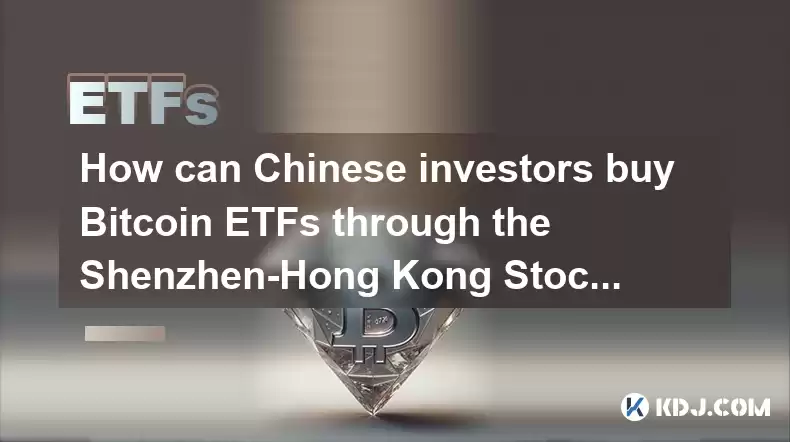
Understanding the Current Landscape
Currently, there are no Bitcoin ETFs listed on exchanges accessible through the Shenzhen-Hong Kong Stock Connect (SHSC). This is a crucial point to understand. While the SHSC facilitates investment between mainland China and Hong Kong, it doesn't automatically grant access to all Hong Kong-listed assets. The regulatory landscape surrounding cryptocurrencies in mainland China remains restrictive, significantly limiting direct investment in Bitcoin and related products. Therefore, the premise of directly buying Bitcoin ETFs through the SHSC is currently not feasible.
The Regulatory Hurdles
China's regulatory stance on cryptocurrencies has been consistently cautious. The government has banned cryptocurrency trading and mining within mainland China. This has created a significant barrier for Chinese investors seeking exposure to the Bitcoin market. While Hong Kong has adopted a more lenient approach, allowing for the trading of certain crypto-related products, the connection to mainland China through the SHSC is not yet a bridge for Bitcoin ETFs. This regulatory divergence is a key factor.
Exploring Alternative Investment Avenues
Although direct Bitcoin ETF investment via SHSC is unavailable, Chinese investors might explore alternative strategies. These could include investing in companies with significant Bitcoin holdings through the SHSC, provided such companies are listed on eligible Hong Kong exchanges. However, this is indirect exposure and comes with its own set of risks and considerations. The level of Bitcoin exposure would be dependent on the company's investment strategy.
Potential Future Scenarios
The regulatory landscape is constantly evolving. Future changes in either mainland China's or Hong Kong's regulatory approach to cryptocurrencies could potentially open up avenues for Bitcoin ETF investment through the SHSC. However, any such changes would need to address the existing concerns about market volatility, investor protection, and the potential for illicit activities. This is a long-term prospect, and predictions are speculative.
The Mechanics of the Shenzhen-Hong Kong Stock Connect
The SHSC allows qualified mainland Chinese investors to invest in stocks listed on the Hong Kong Stock Exchange (HKEX) and vice versa. It operates through designated brokerage accounts and requires compliance with specific regulations. The process involves opening an account with a qualified brokerage firm in mainland China, linking it to a Hong Kong brokerage account, and then trading through the designated trading platform. However, the eligibility of specific assets is determined by the regulatory bodies.
Why Bitcoin ETFs Are Not Yet Available via SHSC
Several factors contribute to the unavailability of Bitcoin ETFs through the SHSC. These include the regulatory uncertainty surrounding cryptocurrencies in mainland China, concerns about market manipulation and volatility, and the need to establish robust investor protection mechanisms. The lack of a clear regulatory framework for Bitcoin ETFs in Hong Kong, suitable for cross-border investment via the SHSC, also plays a significant role.
Understanding the Risks
Investing in any cryptocurrency, even indirectly, involves significant risk. Bitcoin's price is highly volatile, meaning it can experience substantial price swings in short periods. Regulatory changes can also significantly impact the value of Bitcoin and related investments. Investors should carefully assess their risk tolerance before considering any exposure to the cryptocurrency market, regardless of the investment method.
Potential Future Developments
While currently inaccessible, the future may hold different possibilities. The growing global adoption of cryptocurrencies, coupled with the increasing sophistication of regulatory frameworks, might eventually lead to the availability of Bitcoin ETFs accessible through the SHSC. However, this is a long-term prospect, and the timeline remains uncertain. It would depend on significant shifts in both Chinese and Hong Kong regulatory policies.
Navigating the Complexities
Investing in cryptocurrencies requires a thorough understanding of the market, the associated risks, and the regulatory landscape. Independent research and consultation with financial advisors are crucial before making any investment decisions. Relying solely on information from online sources can be risky, as information accuracy can vary greatly.
The Role of Hong Kong in the Equation
Hong Kong's position as a global financial hub and its relatively more open approach to cryptocurrencies compared to mainland China make it a potential gateway for Chinese investors seeking exposure to the crypto market. However, the regulatory framework in Hong Kong needs to be sufficiently robust and aligned with mainland China's regulations to enable seamless cross-border investment through the SHSC.
The Importance of Due Diligence
Before considering any investment strategy, conducting thorough due diligence is crucial. This includes researching the financial health and reputation of any companies involved, understanding the risks associated with the specific investment, and carefully reviewing all relevant regulatory information. Ignoring due diligence can lead to significant financial losses.
Staying Informed
The cryptocurrency market is dynamic and constantly evolving. Keeping abreast of regulatory changes, market trends, and technological developments is crucial for investors. Regularly reviewing investment strategies and adapting them to changing circumstances is essential for managing risk and maximizing potential returns.
Frequently Asked Questions
Q: Can I directly buy Bitcoin through the Shenzhen-Hong Kong Stock Connect?
A: No, direct purchase of Bitcoin is not currently possible through the SHSC due to regulatory restrictions in mainland China.
Q: Are there any Bitcoin ETFs available through the SHSC?
A: No, currently there are no Bitcoin ETFs listed on exchanges accessible via the SHSC.
Q: What are the alternative ways for Chinese investors to gain exposure to Bitcoin?
A: Indirect exposure through companies with Bitcoin holdings listed on the HKEX, accessible via the SHSC, is a possibility. However, this is indirect and carries its own risks.
Q: What are the main regulatory hurdles preventing Bitcoin ETF access via SHSC?
A: China's strict regulatory stance on cryptocurrencies and the lack of a fully harmonized regulatory framework between mainland China and Hong Kong for Bitcoin ETFs are the primary obstacles.
Q: Is it likely that Bitcoin ETFs will become available via SHSC in the future?
A: It's possible, but dependent on significant regulatory changes in both mainland China and Hong Kong. The timeline remains uncertain.
Disclaimer:info@kdj.com
The information provided is not trading advice. kdj.com does not assume any responsibility for any investments made based on the information provided in this article. Cryptocurrencies are highly volatile and it is highly recommended that you invest with caution after thorough research!
If you believe that the content used on this website infringes your copyright, please contact us immediately (info@kdj.com) and we will delete it promptly.
- BlockDAG, SEI, Ethena: Top Crypto Performers Under the Microscope
- 2025-08-03 10:50:16
- Bitcoin Blasts Past $119K: How Institutional Adoption and Macro Shifts Fuel the Fire
- 2025-08-03 10:55:16
- Crypto, Grok, and August: Decoding the Latest Trends and Insights
- 2025-08-03 11:10:16
- Crypto, Phishing, and Your Wallet: A New Yorker's Guide to Staying Safe
- 2025-08-03 10:30:16
- Troller Cat Meme Coin Presale Soars: A New King in the Crypto Jungle?
- 2025-08-03 10:30:16
- Grayscale, Altcoin Trust, and Mid-Cap Mania: What's the Deal?
- 2025-08-03 08:50:16
Related knowledge
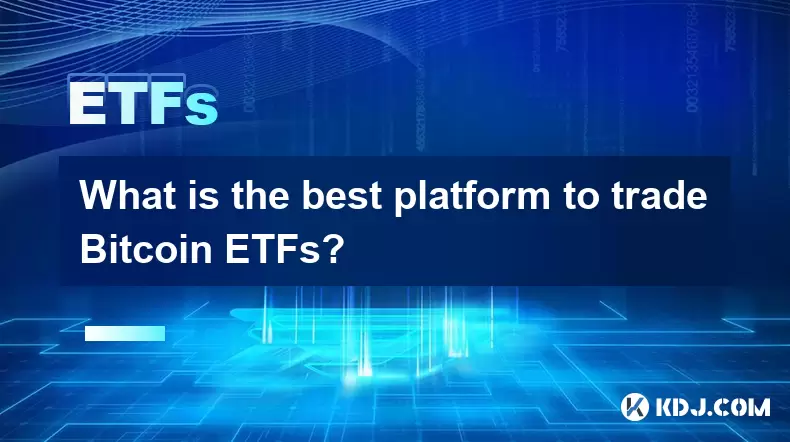
What is the best platform to trade Bitcoin ETFs?
Jul 23,2025 at 04:14am
Understanding Bitcoin ETFs and Their Role in TradingBitcoin Exchange-Traded Funds (ETFs) have gained significant traction among traditional and crypto...
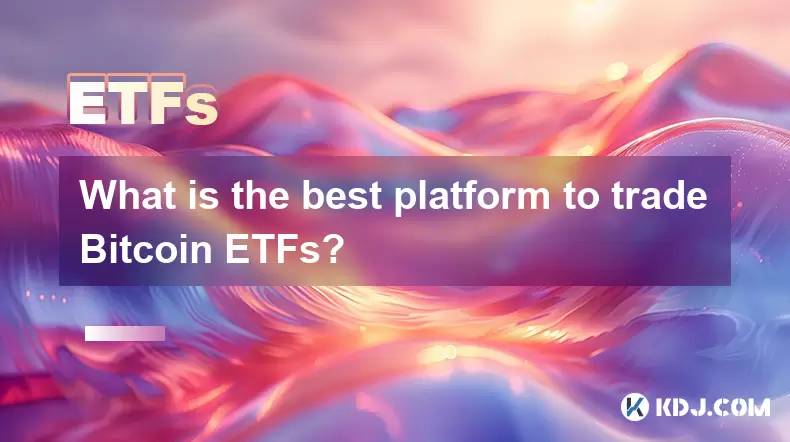
What is the best platform to trade Bitcoin ETFs?
Jul 17,2025 at 03:50pm
Understanding Bitcoin ETFs and Their Role in the MarketBitcoin Exchange-Traded Funds (ETFs) are investment vehicles that track the price of Bitcoin wi...
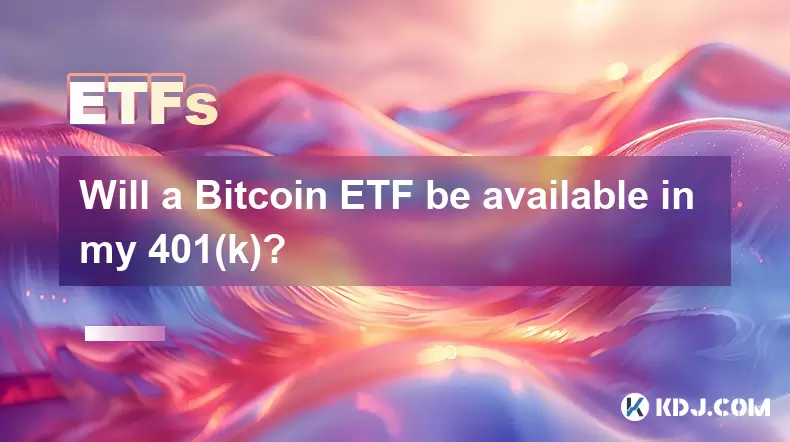
Will a Bitcoin ETF be available in my 401(k)?
Jul 17,2025 at 10:42pm
What is a Bitcoin ETF?A Bitcoin ETF (Exchange-Traded Fund) is an investment vehicle that tracks the price of Bitcoin without requiring investors to di...
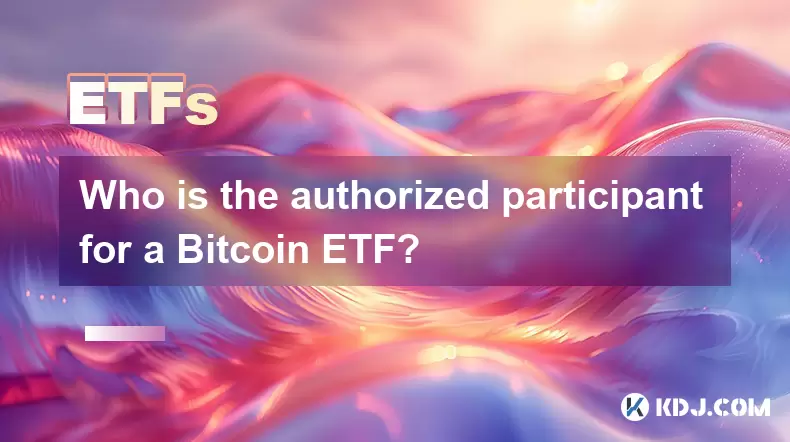
Who is the authorized participant for a Bitcoin ETF?
Jul 18,2025 at 12:42am
Understanding the Role of Authorized Participants in Bitcoin ETFsIn the context of Bitcoin Exchange-Traded Funds (ETFs), an authorized participant (AP...
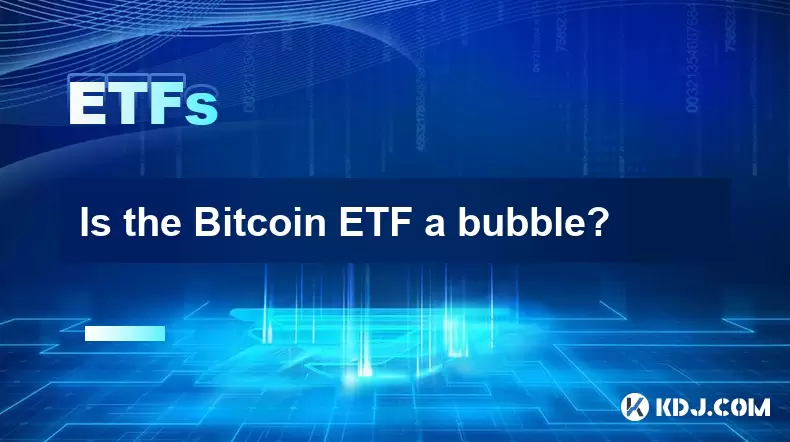
Is the Bitcoin ETF a bubble?
Jul 20,2025 at 06:57am
Understanding the Bitcoin ETF ConceptA Bitcoin Exchange-Traded Fund (ETF) is a financial product that aims to track the price of Bitcoin without requi...
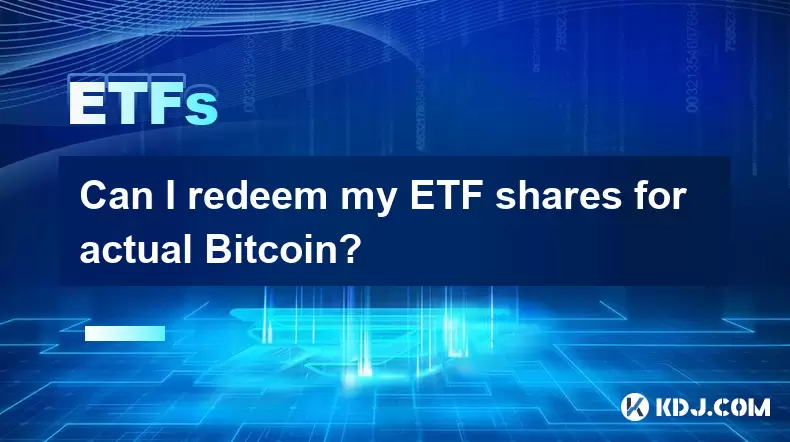
Can I redeem my ETF shares for actual Bitcoin?
Jul 17,2025 at 03:14pm
Understanding ETF Shares and Their Relation to BitcoinExchange-Traded Funds (ETFs) have become a popular investment vehicle for those looking to gain ...

What is the best platform to trade Bitcoin ETFs?
Jul 23,2025 at 04:14am
Understanding Bitcoin ETFs and Their Role in TradingBitcoin Exchange-Traded Funds (ETFs) have gained significant traction among traditional and crypto...

What is the best platform to trade Bitcoin ETFs?
Jul 17,2025 at 03:50pm
Understanding Bitcoin ETFs and Their Role in the MarketBitcoin Exchange-Traded Funds (ETFs) are investment vehicles that track the price of Bitcoin wi...

Will a Bitcoin ETF be available in my 401(k)?
Jul 17,2025 at 10:42pm
What is a Bitcoin ETF?A Bitcoin ETF (Exchange-Traded Fund) is an investment vehicle that tracks the price of Bitcoin without requiring investors to di...

Who is the authorized participant for a Bitcoin ETF?
Jul 18,2025 at 12:42am
Understanding the Role of Authorized Participants in Bitcoin ETFsIn the context of Bitcoin Exchange-Traded Funds (ETFs), an authorized participant (AP...

Is the Bitcoin ETF a bubble?
Jul 20,2025 at 06:57am
Understanding the Bitcoin ETF ConceptA Bitcoin Exchange-Traded Fund (ETF) is a financial product that aims to track the price of Bitcoin without requi...

Can I redeem my ETF shares for actual Bitcoin?
Jul 17,2025 at 03:14pm
Understanding ETF Shares and Their Relation to BitcoinExchange-Traded Funds (ETFs) have become a popular investment vehicle for those looking to gain ...
See all articles

























































































